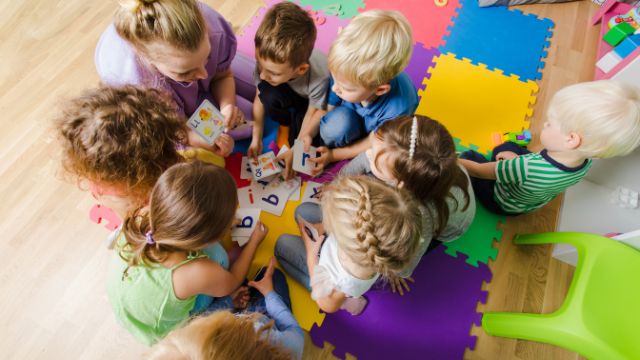In the vibrant journey of childhood, social learning plays a crucial role in shaping a child’s overall development. Those first steps into the world outside the home are often taken in day care centres or preschools, where the foundation of socialization is laid. The preschool and daycare environment is designed to encourage activities for kids that enhance holistic growth. These early interactions not only set the stage for academic success but also nurture essential life skills that pave the way for healthy relationships and emotional intelligence. Let’s delve into the profound benefits of socialization in early childhood through day care experiences and how they contribute to a child’s growth.

Social Learning: The Heart of Early Development
Children are naturally curious and thrive on interactions with their environment. Daycare provides a structured setting where they can interact with peers, teachers, and caregivers. Through these interactions, children engage in social learning, a process where they observe, imitate, and learn from others. This forms the foundation for language development, emotional regulation, and the understanding of social cues. The diverse environment of a day care centre exposes children to various personalities, backgrounds, and communication styles, fostering an inclusive mindset and cultural awareness.
Building Blocks of Communication
Effective communication is the cornerstone of any successful relationship. Day care offers ample opportunities for children to express themselves verbally and non-verbally. Engaging in conversations with peers and adults helps children refine their language skills, expand their vocabulary, and learn how to articulate their thoughts. These skills are not only vital for academic pursuits but also lay the groundwork for future networking and collaborative abilities.
Nurturing Empathy and Emotional Intelligence
socialization in early childhood in daycare contributes significantly to the development of empathy and emotional intelligence. As children interact with their peers, they begin to understand different emotions and viewpoints. They learn to identify their own feelings and recognize emotions in others. This skillset is instrumental in forming strong interpersonal connections and resolving conflicts in a healthy and compassionate manner.
Playful Learning: Activities for Holistic Growth
These activities for kids encompass physical, cognitive, and emotional dimensions, ensuring that children develop well-rounded skills. From creative arts and group projects to cooperative games, these activities provide a platform for children to learn how to work together, share ideas, and respect each other’s contributions.
Preparation for Future Education
Socialization in preschool and daycare is a valuable steppingstone for formal education. Children who have experienced early socialization tend to adapt more easily to the classroom setting. They are familiar with routines, comfortable with group dynamics, and possess the necessary skills to engage in cooperative learning. This familiarity with structured settings and peer interactions sets them up for a smoother transition to kindergarten and beyond.
Boosting Self-Confidence
Confidence is nurtured through positive interactions and achievements. Daycare offers a supportive atmosphere where children can explore their interests and strengths. Engaging in group activities for kids, presenting ideas, and receiving praise for accomplishments boosts their self-esteem. This foundation of self-confidence empowers children to face new challenges with enthusiasm and resilience.
Strengthening Social Bonds
Daycare experiences foster the formation of enduring social bonds. The friendships children cultivate during these early years often endure throughout their lives. These relationships teach them the value of loyalty, trust, and shared experiences. Furthermore, the support network built through daycare can be a valuable resource for parents, as they connect with other families who are navigating similar parenting journeys.
Encouraging Independence
Socialization in daycare encourages children to develop independence and autonomy. As they interact with peers and participate in various activities, they learn to make decisions, solve problems, and navigate social situations on their own. This sense of independence nurtures a strong sense of identity and self-reliance.
Resilience and Adaptability
The world is full of diverse experiences and challenges. Children who have been exposed to early socialization in daycare are better equipped to handle new situations with resilience and adaptability. They have already navigated various social scenarios, making them more open to change and better prepared to thrive in different environments.
In conclusion, the benefits of early socialization through daycare are both profound and far-reaching. From honing communication skills and fostering empathy to nurturing independence and building a strong foundation for education, the impact of socialization in preschool and daycare centres cannot be overstated. These experiences equip children with the tools they need to become well-rounded individuals who are not only academically proficient but also socially adept. As parents and caregivers, recognizing the importance of early socialization can lead to a more enriched and fulfilling childhood for the next generation.
Santosh Kumar is a Professional SEO and Blogger, With the help of this blog he is trying to share top 10 lists, facts, entertainment news from India and all around the world.
